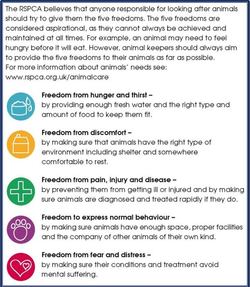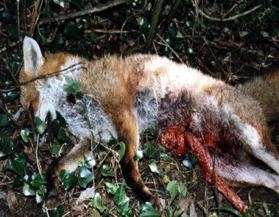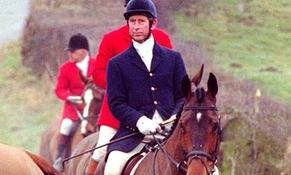 From complaining about RSPCA uniforms copying the police force to pet owners complaining they weren’t allowed to say goodbye to their ‘beloved’ pets, it seems that the RSPCA is constantly being abused in the pro-hunt press. Let’s debunk a few myths surrounding the ‘sinister and nasty’ charges levelled at the RSPCA by those who have fallen foul of UK’s animal protection laws. In 1824 the idea for the RSPCA was conceived in a coffee shop in London. In 1829, five years after the beginning of the RSPCA, Sir Robert Peel, who was Home Secretary at the time, presided over the Metropolitan Police Act which provided permanent appointed Constables who were paid to protect the Capital as part of the Metropolitan Police Force. The early police uniforms were actually not dissimilar to those already worn by the RSPCA, and were chosen because the Peelers wanted to look more like ordinary people. Richard Martin MP (who was also a keen fox hunter) William Wilberforce MP and the Reverend Arthur Broome wanted to do something positive to protect farm animals from cruelty, particularly cattle. Odd that a fox hunter should be so blinkered in his approach that he did not consider the suffering his sport caused to wild animals in the countryside, but whatever Mr Martin’s blind spot might have been, his Bill, which when it became Law, saw the beginning of the RSPCA which has gone from strength to strength in spite of its detractors. Today the RSPCA uniform is still more or less as it ever was, minus the tail coat and top hat. The RSPCA insignia is always clearly and prominently displayed. RSPCA inspectors never act without an owner’s permission unless an animal is suffering or in a dire emergency. If the court feels evidence has been wrongly obtained, it can refuse to admit it. All RSPCA officers carry RSPCA ID cards, and their vans are clearly liveried with the RSPCA logo. “All ranks within the Inspectorate wear a white shirt with obvious RSPCA logo on the left breast. All ranks, except Animal Collection Officers, are provided with a formal uniform for use at special occasions such as Court hearings and ceremonial occasions. During major rescues, specialist teams of Inspectorate staff may opt for a more casual dark blue polo shirt with RSPCA embroidered logo. RSPCA Anyone, even the most myopic amongst us, can see immediately that the RSPCA is in no way trying to emulate the police force, or imbue its inspectorate with special powers above and beyond the rest of us.  The police and Government Animal Health Officers are the only people who have the powers of entry if animal cruelty is suspected. Usually this happens after a court order is obtained, although there is provision in the Animal Welfare Act (AWA) in emergency situations. The RSPCA inspectorate do not force their way into people’s homes and seize animals, if they did, they would be breaking the law and would be open to prosecution. As we have NEVER seen the RSPCA in court for breaking, entering and stealing animals, I think it’s safe to assume that this is because that is not how the Society carries out its work. The RSPCA relies on the statutory powers of the police with whom they have an excellent working relationship. Similarly, the RSPCA does not keep a band of lawyers on its payroll for prosecuting animal abuse cases. The lawyers used by the RSPCA are independent people who happen to be the best in their field, and well versed in dealing with animal cruelty law. The RSPCA exercises the right that we all have as private citizens to bring private prosecutions against those who neglect or deliberately abuse animals both wild and domestic. In almost all cases of abuse and neglect, concerned neighbours have alerted the RSPCA to the animal suffering, and again in most cases the RSPCA will offer advice and support in the first instance. If the case is escalated because conditions for the animal have not improved, only then is prosecution and seizure of the animal concerned considered. When taking out a private prosecution, the RSPCA follows the same code for public interest as the Crown Prosecution Service (CPS). The Full Code Test has two stages: (i) the evidential stage; followed by (ii) the public interest stage, and if the criteria are not met for those two stages, the RSPCA does not go on to prosecute. We must also remember that the CPS can stop a prosecution at any time if it is thought to be not in the public interest. This has happened in only a handful of cases, and the RSPCA has a much better success rate than the hard pressed and underfunded CPS, which is saving the tax payer millions of pounds a year. No one wants to think an animal has been left to suffer through thoughtlessness or from deliberately inflicted cruelty. The AWA of 2006 puts a duty of care on pet owners today. It is no longer good enough to acquire a pet on a whim and then neglect that pet because the owner either can’t be bothered or forgets to provide clean water or provide proper living conditions, or because they haven’t researched the needs of the animal properly. Neither is it acceptable to neglect an animal because the owner is frail or has special needs. It is a misconception, and one the 2006 Act makes perfectly clear, that to own an animal does not mean someone can treat that creature however they think best without repercussions of one sort or another. The RSPCA is simply doing what it says on the tin, it is standing up for animals, that is putting animals first. To prosecute someone for neglect or abuse is not undertaken lightly. A full team of experts including experienced vets, is mobilised and each individual case is discussed at length, with prosecution being a last resort. Many people are given advice and help and it is only if that advice is ignored and conditions for the animal don’t improve that prosecution is considered. Disability Now magazine, one of the RSPCA’s disgruntled detractors, has criticised the RSPCA, claiming the Charity unfairly targets the elderly and disabled people. Yet there was agreement that the animals in those cases did suffer, and the RSPCA, regardless of the reason for the suffering, has a duty to the animals it exists to protect. RSPCA inspectors receive comprehensive training on the Police and Criminal Evidence Act. If it is deemed necessary to go to court, and if the court has convicted, then there must have been a case to answer. As the only charity who investigates animal cruelty, an RSPCA Inspector’s job is one of a kind. They are on the front line of animal abuse, sometimes dealing with horrific neglect and suffering. The training to become an RSPCA inspector lasts 12 months, it is intense and physical covering all aspects including rescues and cruelty. The RSPCA does a wonderful job, it is a much needed and respected British organisation at the forefront in the fight against animal cruelty in the UK. If you care about animals consider joining the RSPCA and be part of that force for goo
0 Comments
 (He was however reprimanded for his imprudence at a later date). Unfortunately for Mr Barnfield et al, the evidence of blatant hunting was irrefutable, and they had no option but to ‘fess up, and Justice Tim Pattinson had no other option but to bring in a verdict of guilty. He fined the Heythrop hunt and its members £6,800, but then he rounded on the RSPCA for spending £330,000 to bring the case. “Members of the public may feel that RSPCA funds can be more usefully employed,” he told Oxford Magistrates' Court. Perhaps he’d not heard that the Spindles Farm prosecution, brought against farmer Grey for cruelty to his horses, cost three times that amount and the RSPCA was praised on that occasion for their professionalism and diligence. Obviously Prince Charles feels the same. He wants the RSPCA to spend its time on other cruelties, the likes of which won’t affect his hunting chums. The police don’t seem to bother, and the CPS are not in a good place right now with funding cuts and no real experts to take on hunting cases. If only the RSPCA would just concentrate on more working class sadisms, like lamping and dog fighting, fox hunters could then carry on Tally Ho Ho Ho-ing and hollering all over England’s green and pleasant land with no hindrance to their enjoyment. The disembowelling of our precious wildlife for the sheer entertainment value of it all would go on as before with little fear of prosecution. Of course the Countryside Alliance (CA) is cock a hoop with his Royal Huntness. That bastion of all that is wrong and bloody in the UK countryside thinks it’s a great idea for Charlie to threaten the RSPCA with dissociation from all things Royal. The CA CEO, Tim Bonner, had this to say, "Anyone considering taking on the patronage of the RSPCA would have to consider its future direction and whether it is going to continue down a radical campaign path. If it reverts to its traditional role as a welfare charity protecting animals I am sure nobody could have any reason not to support its work." In all honesty, would it be so bad if the RSPCA dropped the ‘R’? RSPCA supporters think not. In fact many people have been unhappy for some time that the bloodthirsty in the highest circles continue to support killing wild animals.  Prince Charles’ grandsons and his daughter in law, with attendant family, celebrated Kate Middleton’s thirty fourth birthday ‘low key’ blasting away at birds in the seclusion of a private estate. Charles’ sister, the Princess Royal, was a one-time patron of the RSPCA until it was deemed unfit for someone so rabidly pro hunt to front a charity which was founded to promote kindness to animals. The upper echelons have tried for some time to get their bloodstained paws on the RSPCA. In 2001 the RSPCA expelled the Olympic showjumper Richard Meade for orchestrating a campaign to infiltrate the society and overturn its longstanding opposition to hunting. Fortunately the RSPCA has resisted all efforts at take over and has stood firm on its policies against hunting. This ethical and moral stance has not been an easy ride. The Charity’s last CEO was bullied mercilessly for daring to take the rich man’s sport to task. Lies and smears in the pro hunting press, together with continuous bad mouthing from the Country side Alliance, forced Mr Grant to retire on health grounds. At present the Charity is without a new chief executive; a job, in the light of the bile and spite pouring forth from the hunting fraternity, is not one any prospective candidate would take on lightly. In a way, Price Charles is right. The RSPCA will do very well without pro blood sport Royal Patronage. |
Animal mattersCountry lover, amateur naturalist and fox lover fighting to preserve the ban on hunting Archives
September 2016
Categories
All
|




